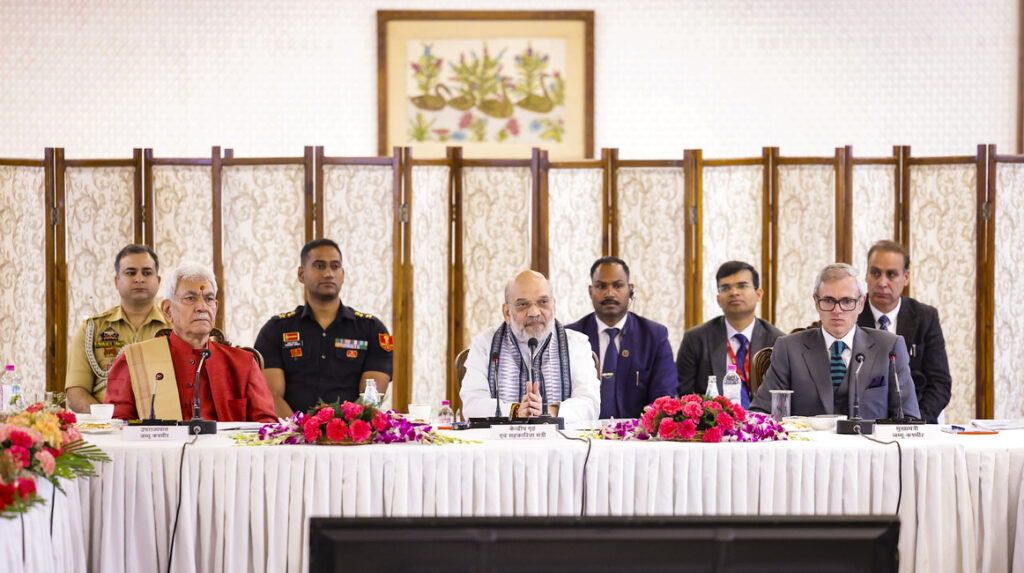
(From left) J&K Lieutenant Governor Manoj Sinha with Union Home Minister Amit Shah and Chief Minister Omar Abdullah at a meeting during Shah’s visit on April 6, 2025
The people of Jammu and Kashmir might have elected a popular government, but the elected representatives lack the power to bring about any substantive change as most of the administrative powers rest with the Lieutenant Governor
Just months after emerging as the single largest party in the Jammu and Kashmir Assembly with a decisive 42- seat victory in the 90 member House, the National Conference (NC) finds itself navigating a troubled political landscape.
What should have been a triumphant return to power for the Omar Abdullah-led party has instead become a stark lesson in the limitations of authority within a Union Territory (UT)—and the shifting realities of governance under New Delhi’s watch.
Despite the strong mandate in the October 2024 elections, the NC government is restricted by a dual power structure that places real control in the hands of Lieutenant Governor (LG) Manoj Sinha. This arrangement has exposed the fragility of democratic power in the region, leaving Chief Minister Omar Abdullah struggling to honour even the most basic of his party’s election promises.
In the run-up to the elections, the NC manifesto brimmed with ambitious pledges—the restoration of Jammu and Kashmir’s special status, a political push for Article 370, promotion of India-Pakistan dialogue, government jobs, free electricity, LPG subsidies, and relief from water and power crises. Yet, six months into governance, the Abdullah administration has failed to fulfil a single major promise.
The explanation lies in a familiar irony: while the people voted for change, the structure of power remained untouched. According to the Jammu and Kashmir Reorganisation Act, 2019 and reinforced by amendments just weeks before the elections—the LG retains overarching control over key areas, including police, civil services, and even prosecution powers. In its election manifesto, the NC—apart from making sweeping pledges to win voter support— promised jobs, the release of political prisoners,
a review of employee terminations over the past five years, 200 free units of electricity, annual distribution of 12 free LPG cylinders to economically weaker households, and relief from chronic power and water crises. However, six months into its term, the NC government has struggled to deliver. Not only has it failed to reinstate terminated employees, it has also been unable to prevent further dismissals carried out by the LG’s administration based on allegations of anti-national activities. The inability to act independently has sparked public discontent, with voters beginning to hold NC leaders accountable for unfulfilled commitments. The crux of the issue lies in the limited administrative authority of the Omar Abdullah government. Under the Union Territory system, key powers—including personnel management and law enforcement—rest with the Lieutenant Governor’s office, leaving the elected government with little room to manoeuvre.
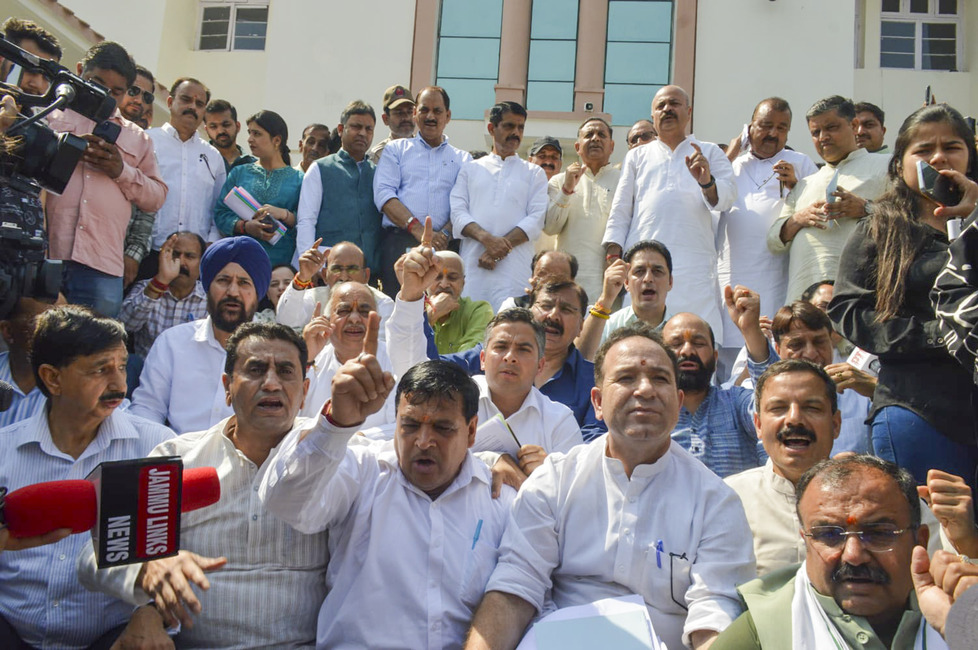
The BJP, which has 28 MLAs in the J&K Assembly, has held CM Omar Abdullah responsible for not fulfilling the electoral promises
Now, facing a crisis of credibility, the NC leadership is seeking a rapprochement with the BJP-led Central government. Since taking office, Abdullah has embarked on a campaign to persuade the Centre to restore full statehood to Jammu and Kashmir, a move he hopes will empower his government
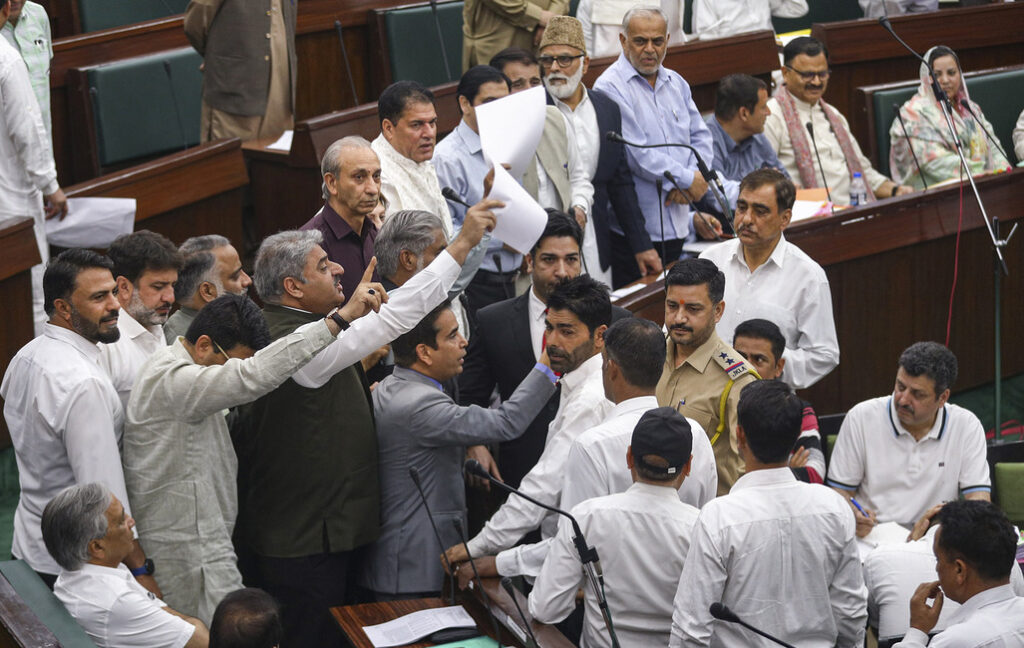
NC MLAs with members of its alliance partners protest over the Waqf (Amendment) Act during the budget session of the J&K Assembly
For now, the NC seems unwilling to antagonise the Centre or the LG, knowing well that only the BJP leadership in Delhi can ease the party’s current predicament. The Abdullahs are pushing for the restoration of statehood not only as a constitutional demand but also as a political lifeline
The situation became especially stark with the recent transfer of 48 senior JKAS officers by the LG. The move shocked the Omar Abdullah administration and further highlighted its lack of control. Abdullah condemned the transfers as “illegal” and convened a meeting of his party’s legislators, passing a resolution urging the Centre to respect the democratic mandate. But LG Manoj Sinha remained unperturbed, citing the constitutional framework established by the Jammu and Kashmir Reorganisation Act, 2019.
The predicament is not entirely unexpected. Abdullah had publicly acknowledged—well before the elections—that any government in the Union Territory would be powerless. At one point, he even declared that he would not contest the elections to avoid what he called a “humiliating” position. Despite this, he eventually entered the fray, and now, finds himself in the exact conundrum he once warned about.
Adding to the complexity, just a month before the polls, the Union Ministry of Home Affairs issued amendments to the Rules of Business under the Reorganisation Act, granting the LG sweeping authority over transfers, postings, and prosecution sanctions.
Now, facing a crisis of credibility and authority, the NC leadership— especially Abdullah—is seeking a rapprochement with the BJP-led Central government. Since taking office on October 16, 2024, Abdullah has embarked on a campaign to persuade the Centre to restore full statehood to Jammu and Kashmir, a move he hopes will empower his government and salvage its public image.
On his first visit to New Delhi as chief minister, Abdullah presented his cabinet’s resolution for the restoration of statehood directly to Prime Minister Narendra Modi. He also met senior BJP leaders including Amit Shah, Rajnath Singh, and Nitin Gadkari—gifting Kashmiri Pashmina shawls during these engagements. However, this outreach has drawn sharp criticism from opposition parties in the Valley, who derisively dubbed the meetings “shawl diplomacy”.
The controversy deepened with a recent photograph showing Abdullah and his father, NC President Farooq Abdullah, on a morning walk with Union Minister Kiren Rijiju in Srinagar’s Tulip Garden. Rijiju played a key role in pushing through the controversial Waqf Amendment Bill—a legislation fiercely opposed by many in Kashmir.
What fuelled the backlash further was that, while this photo-op was circulating, Speaker Abdul Rahim Rather—an NC veteran—was disallowing a discussion on the same Waqf Bill in the Assembly. Critics accused the NC of playing a “double game”: publicly opposing the BJP’s moves while quietly courting its leadership behind closed doors.
For now, the NC seems unwilling to antagonise the Centre or the LG, knowing well that only the BJP leadership in Delhi can ease the party’s current predicament. The Abdullahs are pushing for the restoration of statehood not only as a constitutional demand but also as a political lifeline.
With full statehood, the NC could reclaim substantial administrative authority, revive stalled policy initiatives, and rebuild public trust.
Yet, the crucial question remains: Will the Centre grant statehood back to Jammu and Kashmir, and if so, when? Until that answer comes, the NC may continue to rule in name but not in power.


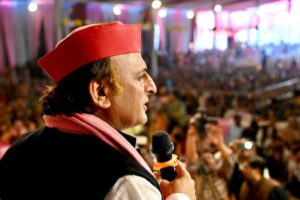
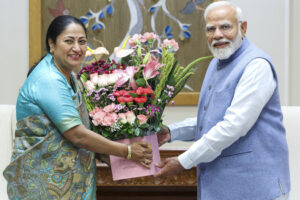
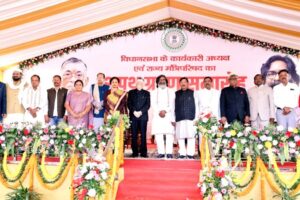
Add Comment